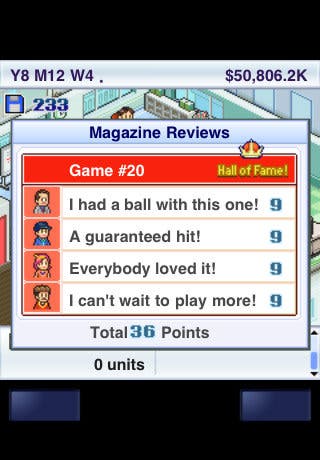Game Dev Story
Dev Con 1.
To make games, you pick a genre and a theme from a list – War Shooter, Samurai Action, Fashion Simulation – then determine its direction by putting points into categories like Innovation, Polish, Game World, Cuteness and so on. Picking good combinations increases your chances of sales success, and if the direction matches the genre you'll level that genre up. After that, you pick one of your staff or an expensive contractor to write the design document, and you're off.
Your games are graded on Fun, Creativity, Graphics and Sound, and the higher those numbers are by the time it's released, the better its chances of critical success. What this means is that you're anxiously watching the numbers tick up and up and up for the whole of the development period, praying for a breakthrough and twitching with annoyance every time one of your tiny sprite producers, artists, coders or writers goes home to sleep.
Your staff are the key to everything. The better their stats and the harder they work, the better your game will be. Training them up in different ways unlocks different themes and genres. It's this as much as anything that gives Game Dev Story so much replay value – experimenting by sending your programmer to college or making the director play pinball constantly throws up new combinations (Mushroom Adventure! Poncho Sim RPG! Mini-Skirt Puzzle!).

It's got oodles of charm as well as simple, enticing mechanics. The lovely 16-bit sprite art style is a perfect fit, infusing the serious business of simulation with cartoon sweetness. Appropriate beepy sound effects accompany everything from your coder's training animation to the director's frenzied brainstorming session.
There are just enough random elements to keep things unpredictable. Boost items, purchased at an exorbitant price, give bonuses of between about 10 and 25 points to one of your game's attributes, but using them costs research data that could otherwise be used to level up your staff. Power outages can sabotage a project, but positive articles in games magazines can help its chances. Do you save up to buy an incredibly expensive license to develop for a new console, or invest all that money in training? There's always something to think about, and before you know it it's stolen hours of your life.
Game Dev Story's adorable Sensible Soccer-style codewording of famous games, companies and designers also never fails to raise a smile. You can develop for the Intendro Whoops or the Sonny PlayStatus. You can hire Gilly Bates, Shigeto Minamoto or Stephen Jobson, and Kairosoft has thrown in its own special characters, including a luchador and a bear. At the annual Global Game Awards, your titles are up against things like Super Sergio Bros and Hunch Out – but some of them make you think a little harder. It's a loveable tribute to gaming history.
Game Dev Story is easily the best thing I've ever played on the iPhone. Unlike most addictive mobile games, which make you hate yourself a little for wasting so much time, it feels like you're investing in something. There's no other game that offers this much depth for £2.39, and it's so adorably packaged that it's impossible to resent it even when it dominates your entire Sunday. I'll get that 10/10 yet.








